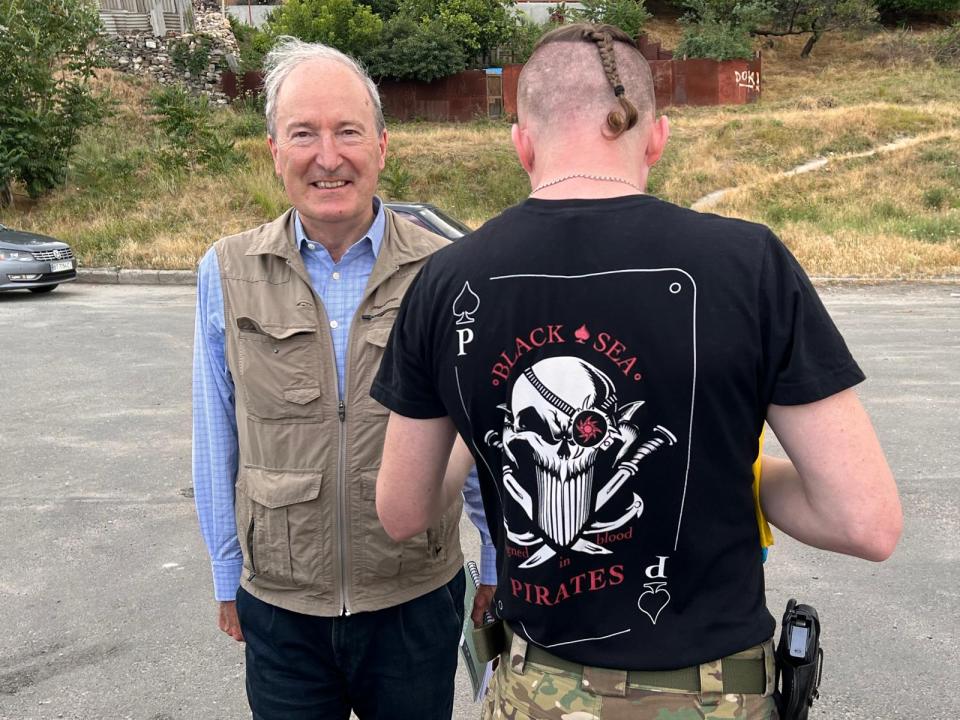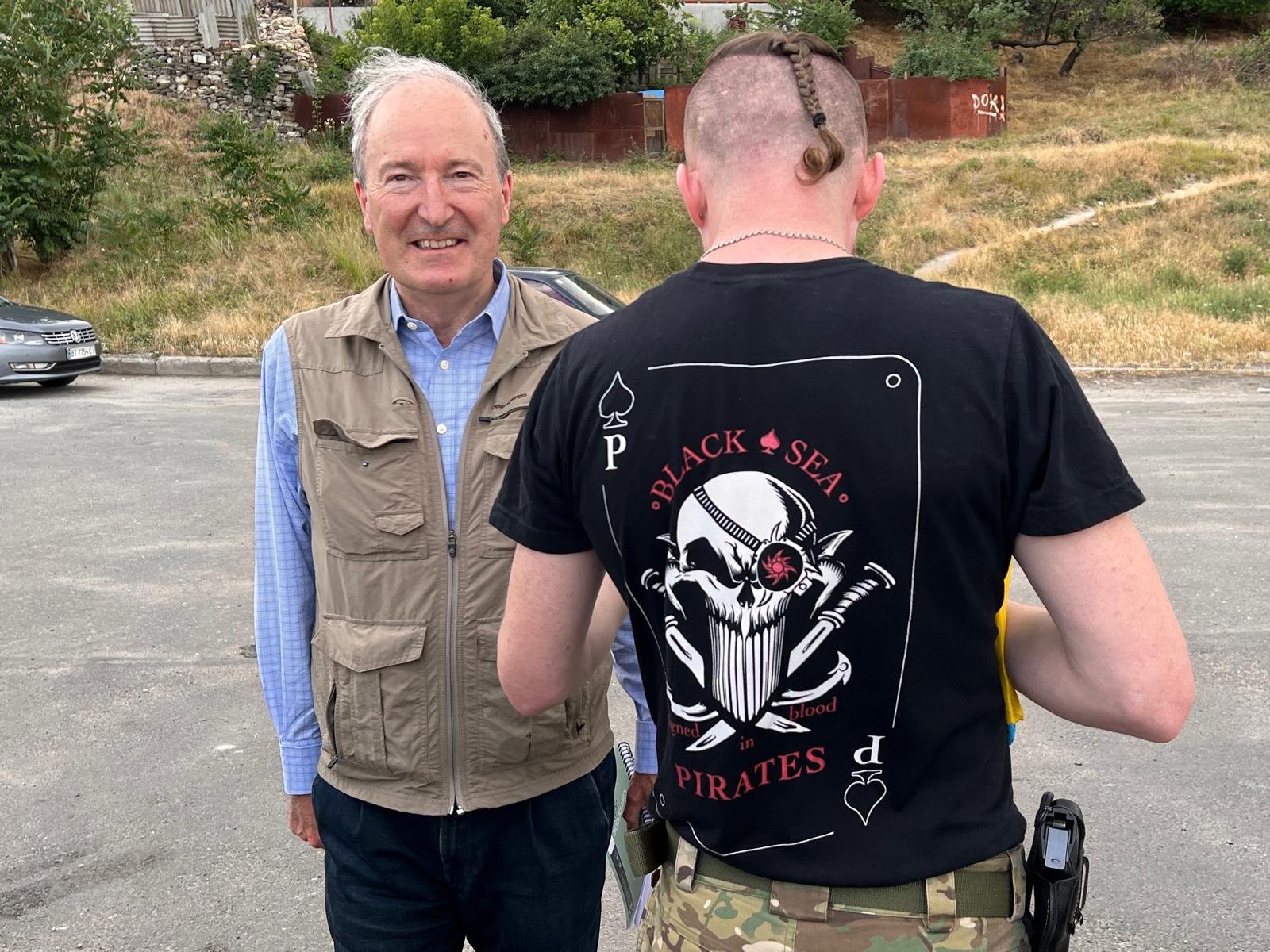Odessa
Our conference here is about Black Sea security, where I am the guest of UK Friends of Ukraine. Its subject reflects one of Ukraine’s greatest, yet least publicised successes. Almost a third of the Russian fleet has been destroyed, mostly by sea drones. The rest is trapped in ports much further east. As a result, almost normal amounts of grain and other goods flow to the wider world. It says something not good about third-world politics that all 11 recipients of WFP relief in the form of Ukrainian grain, including Nigeria, Yemen, the Democratic Republic of Congo and Gaza, support Russia in international forums.
Tony Abbott, the former prime minister of Australia, gives us a rousing keynote speech, praising Ukraine for ‘defeating the Russian fleet without a navy’. He is briefly interrupted by the air-raid app which some delegates keep on. ‘The air alert is over,’ announces its computer voice. ‘The force be with you.’ Is it? This is endlessly debated. On the one hand, US aid is starting to flow once more, and the Russians have had no breakthrough. On the other, Russian will is clearly stronger than that of those western allies who shy off talk of Ukrainian victory, preferring ‘a peaceful settlement’. The effect, though not the intention, is to assist Russian victory. Infirmity of purpose is infectious. A current worry, under-reported in the West, is that, of all the non-combatant countries bordering the Black Sea – Georgia, Bulgaria, Turkey and Romania – only the last is seen as reliable by Ukrainians. There is gloom about the Russian-influenced election due in Georgia on 26 October.
Increasingly, Ukrainians say the underlying problem is that not just Putin but the Russians themselves are blood-crazed imperialists. Given their long experience of suffering, one is ill-placed to argue with them, but this saddens me. The streets of this former 19th-century freeport testify to a cosmopolitan tradition in which Russia intermittently played its part. The figure who looks down the famous Odessa Steps is the Duc de Richelieu, who governed the place in its golden years on behalf of the Tsar. We pass a pedestal from which the statue of Catherine the Great has been removed and replaced by the Ukrainian flag. Starting our tour in Pushkin Street, I feel relieved that his name has not yet been cancelled. After all, when he lived in Odessa 200 years ago, Pushkin celebrated its pan-European quality. But he may well fall soon: the great writer held unsound views on Ukraine, so his memory has been effaced elsewhere in the country. At the top of this column, I have deliberately kept Odessa’s traditional spelling – not, of course, to please Russia, but as a reminder of our common cultural property, rather as we still say ‘Florence’ rather than ‘Firenze’.
We leave town for Mykolaiv. On the outskirts of Odessa, I see the new policy of tighter conscription in action: uniformed soldiers are lifting young men at a bus stop to check whether they are signing up as they should. This causes resentment because the rich can buy themselves out. The bribe required (usually for a medical certificate of ill health) is said to be $20,000. Initially, fears about Ukraine’s birthrate (more than 800,000 births in 2020 and fewer than 200,000 last year) held the government back from recruiting conscripts under 27, but now needs must. The new policy reflects a generational difference. The veterans of the 2014 Crimean invasion, many born in the 1980s, are rock-solid in this conflict. The young are more doubtful.
We are on a delivery job. Missionukraine.uk, with whom I travelled to Kramatorsk last year, drive out 4x4s from Britain to be repurposed as field ambulances. For nine months or so, they have also helped to procure small boats for the dangerous passage across the Dnipro, ferrying soldiers to the fiercely contested far bank. Today, we are collecting both a 4×4 and a boat, the first from a little workshop in a leafy lane, the second, an RIB with a rescued engine, from a charming boathouse built by a tanned, half-naked engineer who cools off from his boat repair by chucking himself into the river – or rather, ‘rivers’, because this is near the confluence of the Southern Bug and Inhul. Here there are ducks and cormorants; trees full of ripe mulberries. The engineer attaches boat to vehicle and we drive it to a nearby strand on the Inhul. We come bearing gifts of power banks, because the Russians’ most damaging tactic at the moment is the destruction of power supplies.
It is a pastoral scene with an onion-domed church in the distance. Men fish, house martins swoop, a girl dives off a bridge and swims, a herd of goats pass – but Oleksiy, a 2014 veteran, who commands the reconnaissance unit of the 124th Brigade, now transferred into the Marines, is impatient for his boat. He has the traditional Cossack long forelock and shaven head which the Russians love to mock. On the back of his black T-shirt is a skull-and-crossbones. His men occupy small islands in the Dnipro, downstream from Kherson. Their presence controls the passage and prevents Russian assault on the city from the river. Intelligence tells him when to expect their attacks. On his iPhone, he shows me grim pictures of the Russians his men have just killed and drone footage of attacks on Russian military huts. But the price is high: last week, one marine lost an eye, another was badly injured, a third was killed; three days ago, three more were wounded. The life of each boat is a few weeks. Best for the commander are quiet little boats with an electric engine or faster ones with much greater horsepower. They best achieve their task under cover of rain. En route back to Odessa, we complete our duties – handing over the 4×4 to a newly formed brigade due for the front. The demand is huge. If you want to help satisfy it as donor or driver, please contact rc@missionukraine.uk.









Comments